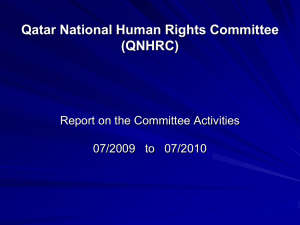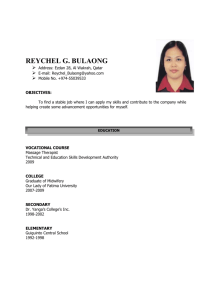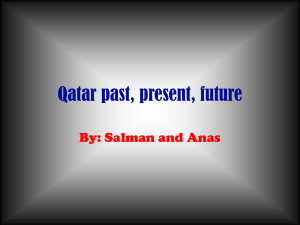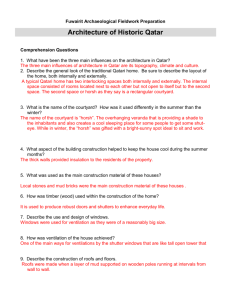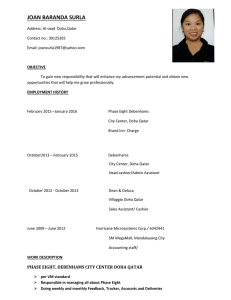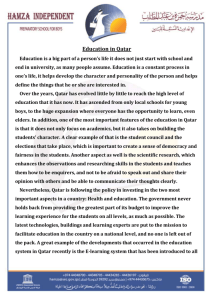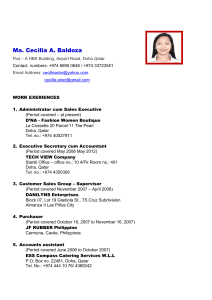H.E. Dr. Hamad bin Abdulaziz Al-Kawari, GLOBAL SERVICES FORUM: BEIJING SUMMIT on
advertisement
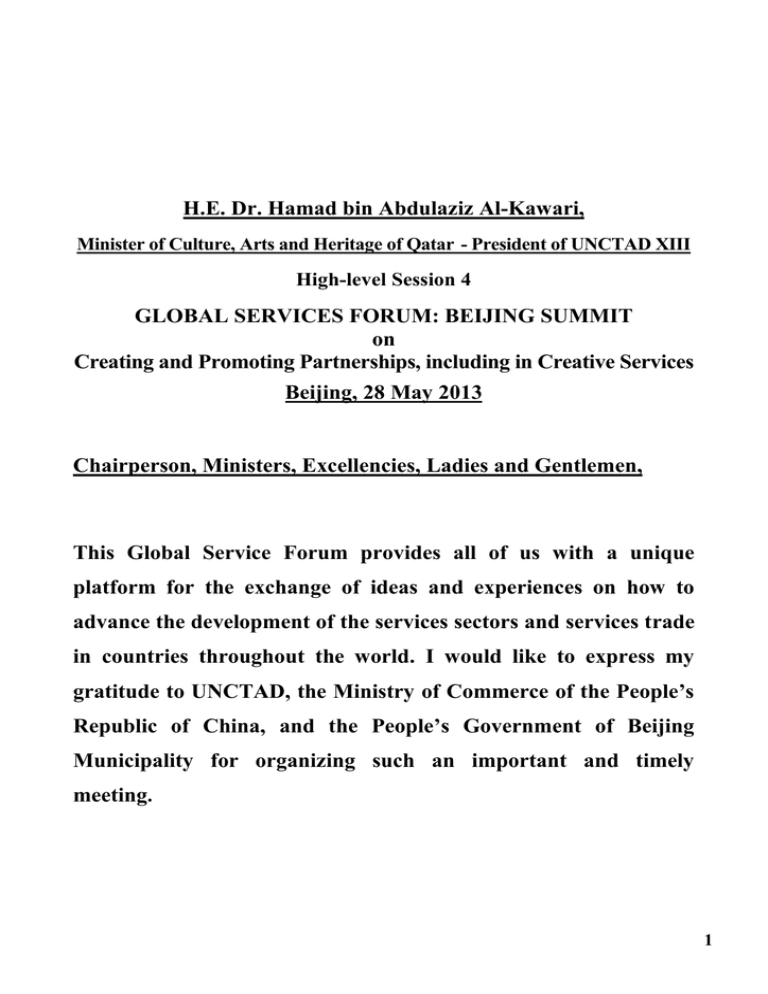
H.E. Dr. Hamad bin Abdulaziz Al-Kawari, Minister of Culture, Arts and Heritage of Qatar - President of UNCTAD XIII High-level Session 4 GLOBAL SERVICES FORUM: BEIJING SUMMIT on Creating and Promoting Partnerships, including in Creative Services Beijing, 28 May 2013 Chairperson, Ministers, Excellencies, Ladies and Gentlemen, This Global Service Forum provides all of us with a unique platform for the exchange of ideas and experiences on how to advance the development of the services sectors and services trade in countries throughout the world. I would like to express my gratitude to UNCTAD, the Ministry of Commerce of the People’s Republic of China, and the People’s Government of Beijing Municipality for organizing such an important and timely meeting. 1 Indeed, I am pleased to share some perspectives as we reflect today on how to nurture the services sector, through partnerships including in creative services, in support of inclusive and sustainable development, poverty eradication and improvement of peoples’ lives. Qatar’s development experience From an economy based on artisanal fishing at the turn of the 20th Century, Qatar has seen tremendous economic growth in recent decades with its GDP spurred by petroleum and natural gas production and exports. This remarkable economic growth has been matched by remarkable progress in improving standards of living for our citizens. Our progress, led under the stewardship of our Emir, continues to ensure that future generations enjoy the benefits of continued economic, social, cultural, and environmental development, offering them unparalleled standards of living and the means to explore their full potential and achieve their ambitions and aspirations. 2 Partnerships linking all of Qatar’s economic actors, including the private sector, have been critical in driving our economy forward, supporting vibrant growth in our creative services industries and charting our future course. They have been central to achieving what UNCTAD has been promoting and as reflected in the Doha Manar and Mandate of UNCTAD 13, namely that trade should contribute to sustained economic growth and inclusive development. In fact, our 2011–2016 National Development Strategy, Qatar’s first, is the culmination of extensive stakeholder consultations, dialogues and analyses. The positive and unprecedented engagement of multiple sectoral and intersectoral stakeholders has been critical in ensuring that our national development objectives, and policies to meet them, respond to the needs and expectations of all actors in our economy taking into account the current rapidly changing global economic environment shaped by globalisation, periodic crises and slow growth in major markets even as emerging economies show greater economic resilience. 3 Services role in development The shared vision of all Qataris is squarely aimed at diversifying our national economy to reduce our dependence on hydrocarbon industries and expanding competitive services industries. As a key goal, we seek to establish Qatar as a services hub in sectors such as financial, air transport, construction, education, healthcare, media and tourism and conference services. At the same time we seek to vitalize our creative services sector in the cultural, entertainment, design and artistic services. We have already made significant strides in this direction, as a few examples will show. Since its establishment less than 20 years ago, Qatar Airways now serves every continent and has been voted Airline of the Year in 2011 and 2012. Qatar Airways truly makes Doha a regional hub for international travel. In the media industry, Doha-based Aljazeera Network has become one of the world’s premier independent news and information companies. 4 And in the recreation and tourism industry, Qatar continues to attract sportsmen from all corners of the world as a host of major international sporting events such as tennis, car and boat racing, golf and soon as a host of the 2022 FIFA World Cup football tournament. We have become an important host of many international conferences including UNCTAD XIII last year. Indeed, Qatar is transforming gains from gas and oil into knowledge – building universities, reforming the school system, improving vocational training and setting up an international forum for finding the most effective forms of innovation. Culture and creativity are intrinsically linked to our national transformation strategy towards a more innovative and modern society. Both are essential in improving the quality of life, enhancing our citizens’ sense of belonging, and creating new knowledge. 5 Creative services Qatar continues to make large investments to develop a favorable environment for the creative economy. We consistently support creative services by organizing festivals, forums, exhibitions and conferences for the intellectuals, writers and artists. This was in the context of implementing the State Cultural Policy that encourages and supports Qatari and Arab creativity, and enhances openness towards foreign cultures from all corners of the world while preserving Qatari traditions. As a result, Doha has become one of the capitals of Arab culture and a magnet for cultural activity. The central role played by Doha in the fields of culture, thought and art are reflected in various festivals and events held on a regular basis that include the Annual Doha Cultural Festival, the Doha International Book Fair, and the Doha Arabic Song Festival among many others. Qatar’s Katara Cultural Village is an example of supporting cultural services development through partnerships. In an effort to provide a home for arts and culture in the heart of Doha the Katara Cultural Village has been established. 6 Culture did not have its fair share of interest, although it is the soft power that may play a positive role in servicing trade and paving the ground for stable international relations based on mutual understanding and respect, and for the achievement of common interests. That is what we have tried to avoid in Qatar; all along the development of our political, and especially economic relations, we have perceived the importance of cultural exchanges among nations. our experience in cultural exchange and interaction between nations and cultures confirms that this kind of communication leaves its imprints on relations as a whole. Hence, we have seen the positive impact of those days and weeks of cultural exchanges between our country and other friendly and brotherly nations from around the world. We dedicated the year 2012 to cultural exchange with Japan. It was a successful year for both majestic cultures. Similarly, the current year, 2013, will be dedicated to cultural exchange with the United Kingdom. So far, we can see the success of this year and its 7 impact on relations between the two countries. It is expected that the year 2014 will be devoted to relations with Brazil. Thus, this trend will continue with other countries in the future. Our cultural initiative is the first of its kind and we believe in its usefulness and impact on overall relations between nations and cultures. Partnerships in the tourism industry are another pillar supporting creative services and the creative economy in Qatar. We recognize that our country needs to be positioned as more than a destination for business travel. Through alliances between firms in the tourism and creative services sectors, we are able to encourage business travelers to extend their stay in Qatar to enjoy the many cultural and sports activities as well as entertainment and recreation available in Qatar. And today, people around the world recognize Qatar as cultural and recreational hub. 8 Conclusion The services sector and creative cultural industries have a catalyzed role to play in the socio-economic development of countries. Strong services partnerships at local, national, regional and international levels can be leveraged to take advantage of the potential offered by the services economy. Such partnerships, we have found, has been a major ingredient in our recipe for the success story of Qatar. Hence I conclude by emphasizing once again that the future of our generation depends on better understanding, developing and harnessing the services economy and trade. THANK YOU 9
